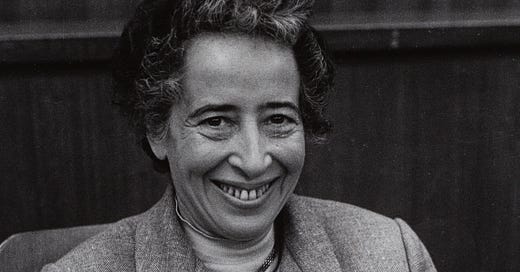Introducing a new Elephant in the Room series, “What Hannah Arendt Can Teach Us Now.”
In recent months, as the political climate has become more tumultuous, people have increasingly turned to the work of Hannah Arendt—particularly on platforms like Substack—as a way to better understand the rise of Trumpism and the erosion of democratic norms in America today. Arendt’s insights into totalitarianism, the fragility of democracy, and the dynamics of political power have gained renewed relevance at a time when American politics is deeply fractured.
At the heart of this series lies the fight against the threat Trump’s political movement poses to democracy itself. We cannot reduce our analysis to simple cause and effect or soundbites that mask the complexity of issues; rather, we need an understanding of the underlying structures of power to improve political campaigns and messaging.
In this The Elephant in the Room series, we’ll remove ourselves temporarily from the polarized public discourse to ask a simple yet pressing question: Do Arendt’s observations about political systems still hold true for the America unfolding before us? Where does her work speak directly to the crises of our time, and where might it need to be reconsidered or updated to account for the world we live in today?
The world she analyzed in the mid-20th century doesn’t always align with the complexities of the 21st century. Arendt wrote about the "bourgeoisie," for example, the elites of the economic middle whose aspirations and social influence were central to her understanding of the rise of totalitarian movements. In our current political discourse, we talk more readily about the “middle class,” a term that carries different connotations and challenges with potentially different allegiances. It’s this tension—between the patterns discussed in Arendt’s work and the specific dynamics of our moment—that this series will explore.
This series will be written as a series of thought-provoking discussions, framed by Arendt’s ideas. I’ll ask questions more than I’ll give answers. Everyone must feel that they have a stake in the fight. If we are to build a broad coalition capable of resisting this threat to our democracy, no group can afford to be marginalized or ignored. By exploring how power is distributed and understanding where systems are failing, we can better ensure liberty and justice for all.




